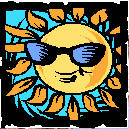|
lifestyle-related diseases
An article, published in the National Geographic Magazine, claimed that the
world healthiest old people were the Okinawas. They were always hardworking and sexually active beyond 100. Their diet contained lots of tofu and seaweed. Ogimi for example: population 3.500, 430 men and women older than 80, and twelve older than one-hundred years at one point. After World War 2 the Island occupied by the US and several Military bases build. When the researchers/scientist came aware of such a large number of healthy old people several Demographic studies where done. The fact that most people reach biblical ages in good health, while in the west most old people reach that age in a state of multi morbidity.
However, those who left Okinawa, changing there traditional lifestyle, experienced a dramatic decline in vitality and life expectancy. Others went to the south where the military bases are located and the American way of live introduced, it is the same story. The youngest generation there is now the fastest in all of Japan, painful ageing and premature death now common. The comparisons of population groups showed a close and consistent relationship between the adoption of the affluent diet & lifestyle and the emergence of a range of chronic diseases, such as coronary heart disease, cerebrovascular disease, various cancers, diabetes mellitus, gallstones, dental caries (cavities), gastrointestinal disorders, various bone and joint diseases and obesity. Even more worrying, that recently acculturated groups in the United States, now eating a diet more like that of the northern European and U.S. general populations develop the diseases, loss of vitality, including painful ageing and premature death. In fact they are the victims, these illnesses a biological response to bad food/lifestyle system. The Food and a lifestyle are things most individuals have little or no control over. Regulated and controlled by the government (Rules and regulation) and the big corporations. You just buy /use the food that is available in the store. Living in a space you can afford, an environment that exist and is getting polluted not just by you, a job because it is the one available. That at least 200 million people in the West are effected and now at risk. A major man made calamity. Despite this realization, lifestyle- and obesity-related diseases are still spreading and becoming more and more prevalent. The politician, always sharp to attract publicity and eager to draw attention to them are now deaf and blind. First, most people affected by it blame themselves, some are even stimulated to do so and do not realise that these illnesses are the result of changes in the food/lifestyle cycle and there environment. These changes are introduced in a stealth way, similar to the introduction of GM now. Same forces and parties at work. At the basis the fact that governments tend to let commercial interest prevail above health considerations and public concerns. Most of the people in Okinawa still believe that Plants are medicine. Therefore; Watch what you allow to enter your body, day after day. In Ogimi you will not find people suffering from cardiovascular diseases, tumours or diabetics, the old people vital and healthy, brains properly functioning.
|
| Introduction |
|
| Personal |
|
| Lifestyle related diseases |
|
| Seaweed, past and present |
|
| Why seaweed |
|
| Nutrition index |
|
| Minerals |
|
| Vitamins |
|
| Daily allowances (RDAs) |
|
| Carbohydrates (sugar) |
|
| Amino acids |
|
| Essential fatty acids |
|
| Slimming |
|
| Polyphenols |
|
| Glyconutrients |
|
| Dietary fiber and health |
|
| Alginic acid |
|
| Bacteria and microorganism |
|
|
|
|
|
|
| 
|